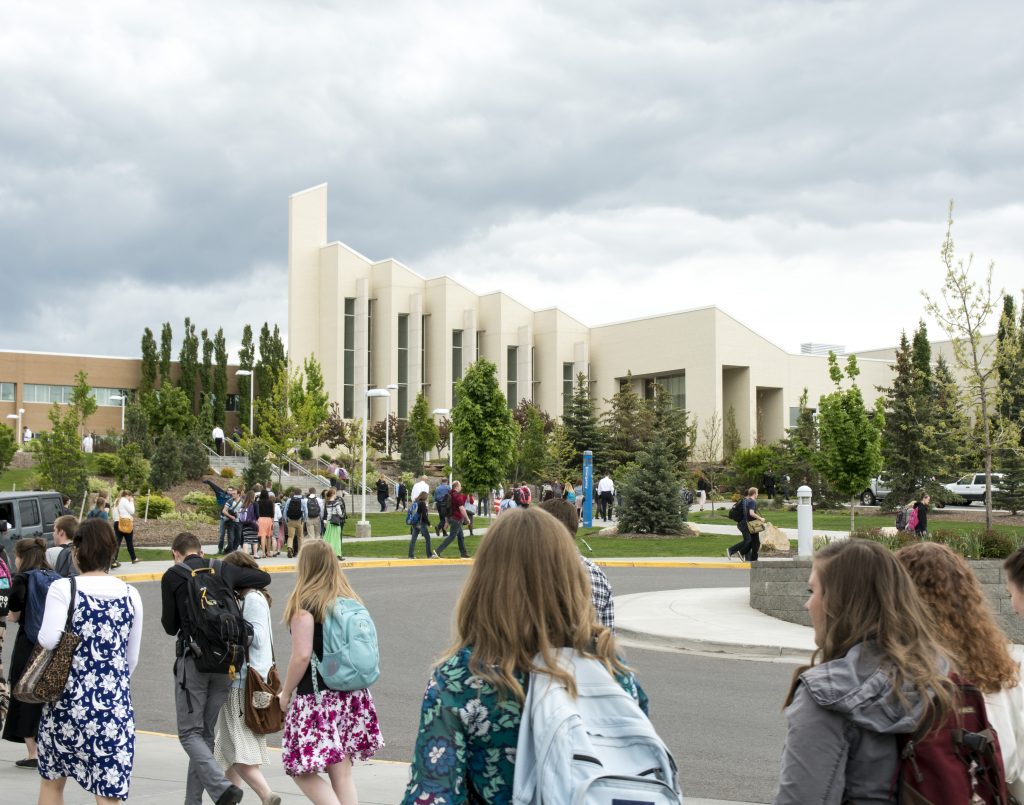
Students make their way to their classes after a devotional. (BYU-Idaho University Relations) 
Students stand outside UVU’s Student Life and Wellness Center. (Courtesy of UVU Marketing/Nathaniel Ray Edwards) 
Students cross the footbridge next to BYU’s bell tower (Jaren Wilkey/BYU Photo).
“What if I’m not good enough?” “Did I have enough extracurriculars in high school?” “Am I well-rounded enough?” “Will I make it in?”
Alannah John recalls questions like those occupying her mind while she sat at her computer, applying for BYU. Now a sophomore studying elementary education, she made the cut, but the application process she remembers was not easy.
“It was kind of nerve-wracking because I really wanted to go here,” John said. “I just remember sitting down at the computer very stressed — overwhelmed. I was kind of worried I wasn’t gonna have enough important things to say of note.”
The application process undertaken by thousands of BYU students isn’t the same as it was. Changes to the application process have been taking place for a little over two years, according to statements published in BYU Magazine.
The changes include the replacement of a section requiring students to mark various checkboxes listing different high school accomplishments with two additional essays. According to BYU Spokeswoman Carri Jenkins, enrollment is also expected to increase 1.5% starting Fall semester of 2020. This increase is expected to continue for six years.
A university news release shared one reason behind the changes being made to the enrollment cap.
“We would like to see every student who enrolls at BYU complete their education, which would increase our already high graduation rate of 86%,” the release said.
Jenkins talked about the reasons behind these changes.
“This is part of a long-term goal to enhance the number of students who can benefit from a BYU education,” Jenkins said. “This goal is part of our inspiring learning initiative, as well as our student success and inclusion efforts.”
In an article on BYU’s vision for “Inspiring Learning,” President Kevin J Worthen talked about BYU’s Aims as well as the push for experiential learning.
BYU’s Aims are for education that is “spiritually strengthening, intellectually enlarging, character building and leading to lifelong learning and service.”
Taking steps toward these learning objectives requires a lot of hard work and dedication. According to Sonia Bartholomew, mother of a BYU applicant and BYU alumna, the essays required for application worried and challenged her daughter.
“It just made it a harder mental task,” Bartholomew said. “She was in her senior year, she’s taking a couple AP classes. That made it a harder thing emotionally — it added to the stress of things.”
It was the challenge that the essays added that Bartholomew said could be beneficial for BYU.
“Maybe there are some people who don’t even apply because it’s harder,” Bartholomew said. “If you’re trying to filter people, it’s a good way to filter them.”
Unlike BYU, BYU-Idaho has experienced steady growth. According to BYU-Idaho Fall 2015 and Fall 2019 campus enrollment statistics posted on BYU-Idaho Newsroom’s website, the University has seen an approximate increase of about 3,030 students. That’s a 17.25% increase from Fall 2015’s campus enrollment of 20,592.
BYU-Idaho Admissions Director Riley Hall said that although they don’t require letters of recommendation, BYU-Idaho admissions still asks for an ecclesiastical endorsement and seminary recommendation.
“It’s a little bit simpler application for BYU-Idaho than it is for BYU’s, which asks for several essays and several letters of recommendation,” Hall said.
The application process isn’t the only thing that makes BYU-Idaho different. To accommodate more students, BYU-Idaho uses the track system. Instead of the school year being split up into fall, winter, spring and summer semesters, the school divides students’ year into three tracks: Spring/Fall, Fall/Winter and Winter/Spring. According to Hall, BYU-Idaho has been using this track system for almost 20 years.
“We’re the only higher education institution in the world that’s using this system,” Hall said.
Though this system has worked well for BYU-Idaho, Hall said he doesn’t expect BYU to follow suit.
“I think BYU’s got a good solid foundation on how they operate and so I would expect that they’d probably continue to operate as they do,” Hall said.
Down the road at UVU, there’s also little concern about BYU’s change in admission policies. The Wolverines have growing pains of their own.
UVU Senior Communications Director Scott Trotter talked about this increase in students.
“Two years ago, we grew by 7%. Last year, we grew by 4.8%. That’s anywhere from 2,500 students to 4,000 students a year,” Trotter said. “One of our biggest challenges here is keeping up with the growth.”
One thing that sets UVU apart from universities such as BYU and BYU-Idaho are the application requirements for admission into the university. Trotter said UVU doesn’t require the ACT or SAT unless the applicant is applying for a merit-based scholarship.
Another difference Trotter said exists is students who are accepted into UVU enter at different educational levels. To encourage proper class-level placement, they require students to take English and math placement tests to assess proficiency in the subjects.
Despite the school’s differences, Trotter cheered BYU’s efforts to increase enrollment.
“Actually, we’re celebrating that because the more people that have the opportunity to go to college we welcome and we’re not worried about growth.” Trotter said.




